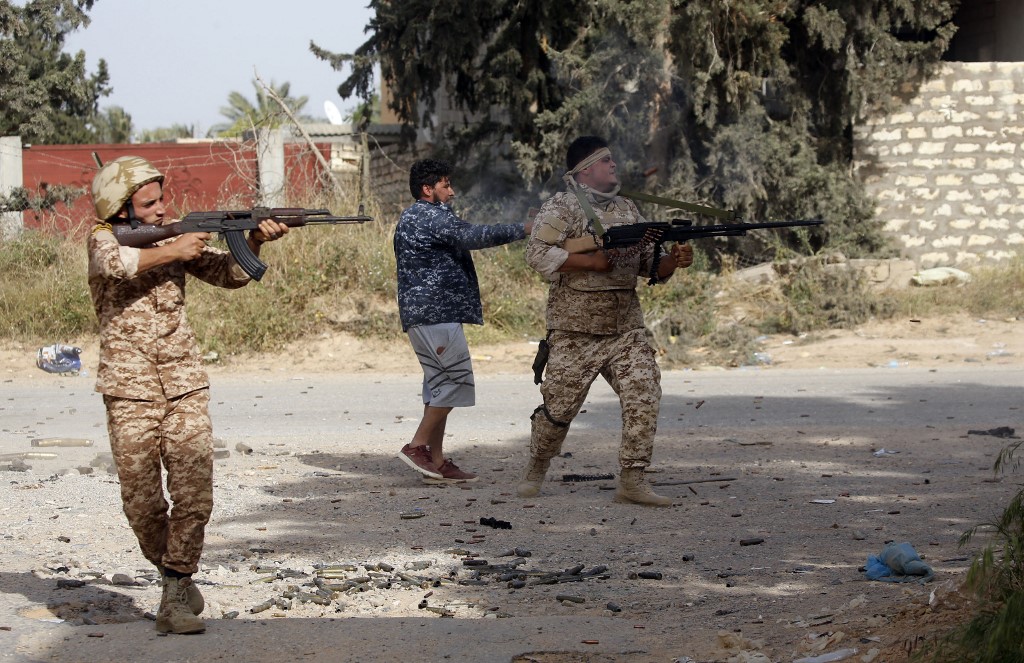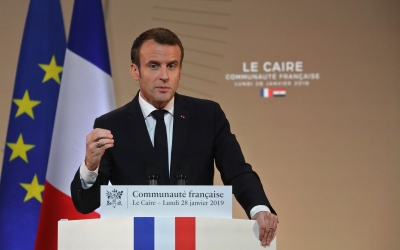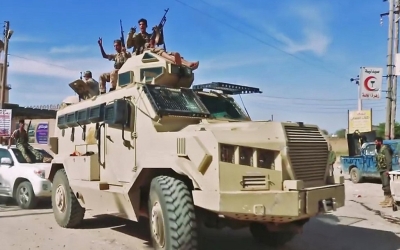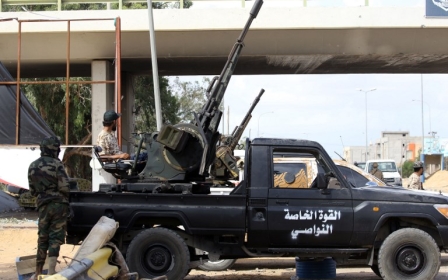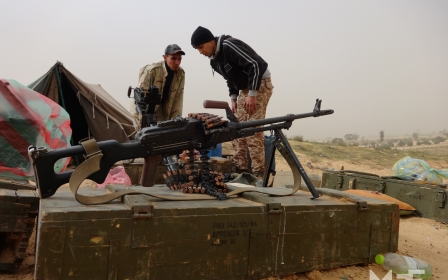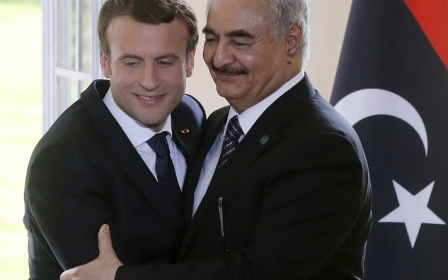The international community has failed Libya

The latest crisis in Libya - eastern military leader Khalifa Haftar’s offensive on the capital Tripoli - has been met with surprise and consternation by much of the world.
But Haftar had repeatedly declared his intention to conquer Tripoli militarily, and is now able to try, thanks to years of enablement by international powers, including Russia, Gulf monarchies and a number of European leaders.
Vying for control
Haftar is head of the self-declared Libyan National Army (LNA), one of several armed factions vying for control of the country. It is rivalled by the UN-recognised Government of National Accord (GNA) - a unity government formed under the December 2015 Libyan Political Agreement - and supported by the eastern-based House of Representatives, which refuses to recognise the GNA.
But this wasn’t inevitable - it happened as a result of the international community’s decade-long complacency and failure to chart a course out of tyranny for a promising, newly-freed country.
New MEE newsletter: Jerusalem Dispatch
Sign up to get the latest insights and analysis on Israel-Palestine, alongside Turkey Unpacked and other MEE newsletters
A representative system that engages the population would fulfil the demands of the 2011 revolution, and bring closure after decades of chaos
“I had more faith in the Europeans, given Libya’s proximity, being invested in the follow-up,” former US President Barack Obama said, according to a 2016 Atlantic article, summarising the complacency of world powers who had moved on too early and failed to follow through.
After toppling former Libyan leader Muammar Gaddafi in a successful NATO intervention in 2011, preventing mass bloodshed and a Syria scenario, European leaders moved on to the next crisis, leaving Libya to manage the messy political struggle - and ensuing civil war - alone.
A 42-year dictatorship left behind no institutions capable of managing a transition, and while a hatred of Gaddafi united revolutionaries in 2011, this wasn’t enough to build infrastructure for transition.
Democracy forgotten
By the time Europe’s migrant crisis began in 2015, Libya’s transition had already faltered. The country’s lack of stability made it an important hub for migration and people-trafficking routes. Under a deal backed by Italy, the government in Tripoli began directly paying militias to capture and warehouse migrants, which undercut the struggling legitimate institutions and fuelled conflict.
EU policies then began to incentivise militias to capture refugees, regardless of conditions or treatment, creating a humanitarian crisis. After the Islamic State (IS) established a stronghold in Sirte, Western powers helped drive them out in 2016 - but this did not prompt a reevaluation of the structural conditions and how to resolve them.
Short-term concerns about migration and counter-terrorism had taken priority over liberal values.
With democracy forgotten, Western leaders fell back on the traditional strategy of finding a local outsourcing partner for security and counter-terrorism - finding a “strongman”. When Haftar, a former Gaddafi military officer, announced his “Operation Dignity” to fight Islamists and extremists in 2014, he fit the bill perfectly.
In 2017, then British foreign secretary Boris Johnson said he supported what he considered to be Haftar’s fight against terrorism after paying him a visit in Benghazi - and shortly afterwards, the warlord was received in Rome with open arms by Italian officials.
Repeated indulgence is a dangerous thing. Haftar’s invasion of the capital commenced just three weeks after French Foreign Minister Jean-Yves Le Drian hailed “significant progress” in his campaign in southern Libya, as he worked his way towards Tripoli.
French support for Haftar has extended far beyond his alleged fight against “terrorism” in the east of the country, and has remained unwavering despite allegations against him, and his self-declared army, of war crimes.
Backing Haftar
Haftar has found staunch backers among Saudi Arabia, the UAE, Jordan, Egypt and Russia, who have provided him with money, arms and equipment. He has also increasingly found support among European states, such as France, which deployed special forces and advisers to support him for years.
France's political bolstering of Haftar has no doubt played a massive part in fuelling his confidence to make even riskier decisions - such as to attack Tripoli.
The fact that this attack began during the visit of the UN secretary-general and a week ahead of a new round of UN talks is brazen, demonstrating how little Haftar fears international opprobrium. This is only vindicated by his experience - after the beginning of the attack, a UN statement meekly called on both sides to exercise restraint, as Russia blocked a UN statement specifically naming the LNA, and France blocked an EU call to stop Haftar's attack on Tripoli.
For the last few years, an increasingly elite-driven stabilisation process has been conducted under the supervision of the UN in gatherings outside the country. It has prioritised bilateral power-sharing agreements between major actors, without regard for popular opinion - a shameful imposition on a country that battled for democracy in 2011. It also encourages spoilers and incentivises military power as a way to leverage negotiations.
Ordinary Libyans, whose overwhelming concerns are security, service provision (water and electricity are still absent for hours at a time in many major cities) and access to money in an economy suffering from a liquidity crisis, are unrepresented in these processes.
They watch negotiations between a political elite “taking over the wealth, investing it overseas, and engaging in money laundering”, by the admission of the UN’s own envoy.
Closure after chaos
Neither the GNA - widely derided by Libyans as corrupt and incompetent, and reliant on militias to extend its limited power - nor the LNA, which has indiscriminately shelled civilian populations and sheltered officers wanted by the International Criminal Court for war crimes - were ever elected by the Libyan people.
It is time for the world to fundamentally reevaluate its approach to Libya’s chronic instability. War will not resolve anything, nor will cliches about necessary strongmen to combat Islamism. In the long term, only inclusive institutions will build a stable, prosperous country that is a stable neighbour and a partner, rather than a powder keg.
The UN transition process will fail unless it becomes more inclusive, by incorporating a wide array of representative and civil society groups
Firstly, international powers must prevent the conflict from escalating. This means cutting off the supply of arms, and censuring and sanctioning states that continue to flout the UN arms embargo.
Secondly, the UN transition process will fail unless it becomes more inclusive, by incorporating a wide array of representative and civil society groups. Libyans with military power should not be the only people at the table.
Finally, while the current security situation does not allow for immediate free elections, building the prerequisites for democracy must be an absolute priority - and that means security and freedom of speech foremost.
Any precedent for impunity could sink Libya. A representative system that engages the population would fulfil the demands of the 2011 revolution, and bring closure after decades of chaos.
The views expressed in this article belong to the author and do not necessarily reflect the editorial policy of Middle East Eye.
Middle East Eye delivers independent and unrivalled coverage and analysis of the Middle East, North Africa and beyond. To learn more about republishing this content and the associated fees, please fill out this form. More about MEE can be found here.


